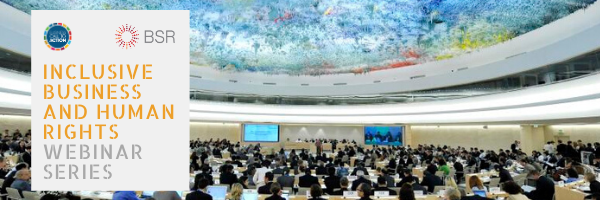Inclusive Business and Human Rights
Details
Key Learnings
- How respecting and promoting human rights is an essential part of being an inclusive business.
- How this can positively impact your competitiveness, reputation, and ability to secure and retain investment.
Description
Masterclass
Learn about what human rights are, why they’re important for inclusive businesses, and how you can successfully implement the UN Guiding Principles on Business and Human Rights. Through these one-hour sessions we will take a practical look at why respect for human rights should be integrated into inclusive business models and guidance on how businesses can do so effectively. The sessions will be led by BSR experts in the business and human rights field with extensive experience working with companies to manage their human rights impacts and implement the UN Guiding Principles on Business and Human Rights
Toolkit
This toolkit aims to give practical guidance to businesses around the world on how to better respect human rights. Whether it’s doing a rapid assessment of human rights risks, gaining internal buy-in, or starting a grievance mechanism, these tools will help you better respect human rights throughout your business. This toolkit is part of the Business Call to Action and BSR’s Masterclass series on inclusive business and human rights – recordings of each of the sessions are also available in this toolkit.

This toolkit is relevant for you if...
- You are interested in or planning to implement a human rights strategy with your business.
- You are affiliated with an inclusive business with a human rights centric topic.
Contact
For more information, visit businesscalltoaction.org or reach out via e-mail.

Syllabus
Videos
- Webinar 1: Human Rights and Inclusive Business 101
-
Learn about what human rights are, why they’re important for inclusive businesses, and how you can successfully implement the UN Guiding Principles on Business and Human Rights.
Date: 16 October 2018
Duration: 59 minutes
Speakers:
- Peter Nestor, Director of Human Rights, BSR
- Michaela Lee, Manager, BSR
- Paula Pelaez, Head of BCtA, BCtA
- Webinar 2: Human Rights 201 – Food, Beverages, Agriculture
-
This session focuses on the human rights risks and opportunities specific to the Food, Beverage, and Ag sector - and how you can successfully apply a human rights framework to your business. It builds on the 101 Masterclass webinar and specifically looks at the most relevant human rights impacts for the Food, Beverage, and Ag sector, including forced labor, right to water, and food security.
Date: 18 October 2018
Duration: 34 minutes
Speakers:
- Peter Nestor, Director of Human Rights, BSR
- Michaela Lee, Manager, BSR
- Webinar 3: Human Rights 202 – Consumer Goods
-
This session focuses on the human rights risks and opportunities specific to the Consumer Goods sector - and how you can successfully apply a human rights framework to your business. It builds on our 101 Masterclass webinar and specifically looks at the most relevant human rights impacts for the Consumer Goods sector, including forced labor, child labor, and worker welfare.
Date: 23 October 2018
Duration: 52 minutes
Speakers:
- Peter Nestor, Director of Human Rights, BSR
- Michaela Lee, Manager, BSR
- Nazila Vali, Knowledge and Partnerships Lead, BCtA
- Webinar 4: Human Rights 203 – Financial Services
-
This session focuses on the human rights risks and opportunities specific to the Financial Services sector—and how you can successfully apply a human rights framework to your business. It builds on our 101 Masterclass webinar and specifically looks at the most relevant human rights impacts for the Financial Services sector, including customer due diligence, bribery and corruption, and discrimination.
Date: 25 October 2018
Duration: 50 minutes
Speakers:
- Peter Nestor, Director of Human Rights, BSR
- Michaela Lee, Manager, BSR
- Webinar 5: Human Rights 204 – Infrastructure, Utilities, Energy
-
This session focuses on the human rights risks and opportunities specific to the Infrastructure, Utilities, and Energy sector—and how you can successfully apply a human rights framework to your business. It builds on our 101 Masterclass webinar and specifically looks at the most relevant human rights impacts for the Infrastructure, Utilities, and Energy sector, including health and safety, bribery and corruption, and vulnerable consumers.
Date: 30 October 2018
Duration: 55 minutes
Speakers:
- Peter Nestor, Director of Human Rights, BSR
- Michaela Lee, Manager, BSR
- Cynthia Wang, BSR
- Ivan Lukas, Outreach and Membership Lead, BCtA
- Webinar 6: Human Rights 301 – Data protection and Privacy
-
This session focuses on how data protection and privacy risks relate to human rights—and how businesses can successfully respect the privacy rights of their customers and employees. It builds on our 101 Masterclass webinar and specifically looks at the data and privacy impacts relevant to almost all businesses.
Date: 31 October 2018
Duration: 53 minutes
Speakers:
- Michaela Lee, Manager, BSR
- Dunstan Allison-Hope, Managing Director, BSR
- Ivan Lukas, Outreach and Membership Lead, BCtA
-
Webinar 7:Human Rights 401 – Using the Human Rights Toolkit
-
This session focuses on how to use all the elements of the Human Rights Toolkit that the BCtA and BSR have developed to help kickstart your human rights efforts. Whether it’s doing a rapid assessment of your business’ human rights risks, or starting a grievance mechanism, these tools will help you better respect human rights throughout your business. This session will be led by experts in the business and human rights field with extensive experience working with companies to manage their human rights impacts and implement the UN Guiding Principles on Business and Human Rights.
Date: 1 November 2018
Duration: 55 minutes
Speakers:
- Peter Nestor, Director of Human Rights, BSR
- Michaela Lee, Manager, BSR
- Ivan Lukas, Outreach and Membership Lead, BCtA
Tools
- Overview and Checklist
-
The first training element presents an overview of the different tools as well as a checklist of the UN Guiding Principles on Business and Human Rights. This checklist should support states and companies that are trying to set up a system aligned with the Guiding Principles to quick analyse if and how business is preventing or addressing negative impacts on human rights.
- Policy Tool
-
This element includes: (1) a checklist of good practice aspects that should be included in a company human rights policy (2) resources and examples and (3) a policy template for companies.
- Internal and External Questionnaires
-
This is element divided into two parts, (1) an interview guide intended to initiate conversations with internal stakeholders about human rights and help identify priority risk areas used for the Rapid Risk Assessment (Due Diligence) and (2) a self-assessment questionnaire for your suppliers.
- Gaining Buy In
-
Achieving buy-in for a human rights program is a frequently cited challenge by human rights practitioners. This step-by-step planning worksheet helps you organise your goals, consider the key points, identify stakeholders and build the business case.
- Human Rights Due Diligence
-
This excel tool is a risk register to support your company while you are identifying potential human rights impacts your business might have. It brings in the risk prioritisation from the guiding principles and provides management ideas as well. For guidance on how to use this tool, please see the Masterclass 401 webinar (14:00 to 24:00).
- Grievance Mechanism Tool
-
This excel tool helps you assess if your grievance mechanism is effective or not using the 8 different effectiveness criteria: (1) Accessibility, (2) Predictability, (3) Rights Compatibility, (4) Transparency, (5) Legitimacy, (6) Equitability, (7) Source of Continuous Learning, i.e. feedback loops and (8) Rights-Holders Engaged in the Design. The principles should be applied to all steps in your grievance mechanism process from (1) the complaint submission phase, to (2) the complaint assessment phase, to (3) the complaint resolution.
-
Sample Human Rights Strategy
-
This tool is a sample Powerpoint on how to transition the risks from the rapid risk assessment to a strategy. Highlighting a sample document with the value proposition and influence on the core of the business and sustainability, the risks and opportunities, the strategy framework, implementation methods, priorities and aspirations and lastly the action plans.
